|
|
|
ADVERTISEMENTS
|
|
PREMIUM
- HAPPY HOLIDAYS!
- Siliconeer Mobile App - Download Now
- Siliconeer - Multimedia Magazine - email-Subscription
- Avex Funding: Home Loans
- Comcast Xfinity Triple Play Voice - Internet - TV
- AKSHAY PATRA - Bay Area Event - Sat. Dec 6
- Calcoast Mortgage - Home Loans
- New Homes in Silicon Valley: City Ventures - Loden Place - Morgan Hill
- Bombay to Goa Restaurant, Sunnyvale
- Buying, Sellling Real Estate in Fremont, SF Bay Area, CA - Happy Living 4U - Realtor Ashok K. Gupta & Vijay Shah
- Sunnyvale Hindu Temple: December Events
- ARYA Global Cuisine, Cupertino - New Year's Eve Party - Belly Dancing and more
- Bhindi Jewellers - ROLEX
- Dadi Pariwar USA Foundation - Chappan Bhog - Sunnyvale Temple - Nov 16, 2014 - 1 PM
- India Chaat Cuisine, Sunnyvale
- Matrix Insurance Agency: Obamacare - New Healthcare Insurance Policies, Visitors Insurance and more
- New India Bazar: Groceries: Special Sale
- The Chugh Firm - Attorneys and CPAs
- California Temple Schedules
- Christ Church of India - Mela - Bharath to the Bay
- Taste of India - Fremont
- MILAN Indian Cuisine & Milan Sweet Center, Milpitas
- Shiva's Restaurant, Mountain View
- Indian Holiday Options: Vacation in India
- Sakoon Restaurant, Mountain View
- Bombay Garden Restaurants, SF Bay Area
- Law Offices of Mahesh Bajoria - Labor Law
- Sri Venkatesh Bhavan - Pleasanton - South Indian Food
- Alam Accountancy Corporation - Business & Tax Services
- Chaat Paradise, Mountain View & Fremont
- Chaat House, Fremont & Sunnyvale
- Balaji Temple - December Events
- God's Love
- Kids Castle, Newark Fremont: NEW COUPONS
- Pani Puri Company, Santa Clara
- Pandit Parashar (Astrologer)
- Acharya Krishna Kumar Pandey
- Astrologer Mahendra Swamy
- Raj Palace, San Jose: Six Dollars - 10 Samosas
CLASSIFIEDS
MULTIMEDIA VIDEO
|
|
|
|
|
NEWS DIARY
India Flays Pak on Mumbai Anniversary
Ambani Shows Off Worlds Priciest Home
Strict Law to Protect Endangered Animals
Sri Lanka President Sworn in for Second Term
Reward for Taliban Info
Tripura Beckons
Anarchy Warning
UN Wants Mechanism
Patil, Assad Meet
Bribes-for-loans Scandal
Bihar Surprise
Nepal President Uses Emergency Powers to Pass Budget
Amicable Solution
Loan Scandal Checks
India Flays Pak on Mumbai Anniversary
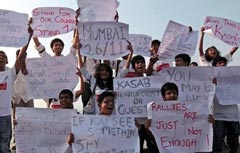 Indians march in of victims of the Mumbai terror attack outside the Taj Mahal hotel in Mumbai. Indians march in of victims of the Mumbai terror attack outside the Taj Mahal hotel in Mumbai.
India rebuked Pakistan for its failure to convict the masterminds of the 2008 Mumbai attacks Nov. 26 as the country marked the second anniversary of the carnage that claimed 166 lives.
Both houses of India's parliament held a minute's silence to honor the victims of 60 hours of violence during which 10 Islamist gunmen attacked a host of targets including luxury hotels, a Jewish centre and the train station.
Police paraded through the city showing off new security hardware, while mourners gathered at the places where civilians were gunned down in cold blood by the heavily armed attackers.
India remains wary of further attacks by Pakistan-based militants and security measures in Mumbai were raised for the anniversary.
"In Pakistan, we have a neighbor who has not fulfilled its promise to bring the 26/11 masterminds to justice," Home Minister P. Chidambaram said, referring to the Pakistan-based Lashkar-e-Taiba network, which India blames for the attacks.
"I sincerely hope that on the second anniversary of this horrific tragedy, Pakistan will realize its responsibility as a nation, as a government and fulfill its promises," he said at a commemoration ceremony in the city.
Speaking in Sri Lanka where he is on a four-day trip, Indian Foreign Minister S.M. Krishna also stressed the need for Pakistan to tackle terror groups within its borders.
"Once again I call upon Pakistan to dismantle the terror machine operating with impunity in territories under its control and to bring all the perpetrators of the Mumbai terror attacks to speedy justice," he said.
|TOP|
Ambani Shows Off 'World's Priciest Home'
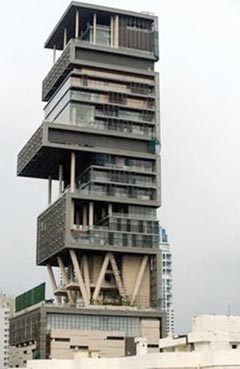 The twenty-seven storey Antilia, the newly-built residence of Mukesh Ambani. The twenty-seven storey Antilia, the newly-built residence of Mukesh Ambani.
Indian billionaire Mukesh Ambani has hosted a lavish housewarming party to show off his just-completed new skyscraper residence, believed to be the world's most expensive private home.
Some 80 of India's rich and famous attended the party at the 27-storey building, which dominates the skyline above the sprawling slums and traffic-choked roads of Mumbai, the Times of India reported.
Indian novelist Shobhaa De, who attended the party, called the building -- reported to be the world's priciest private residence costing over one billion dollars -- "the Taj Mahal of the 21st century.”
Ambani, who heads India's largest private company, petrochemical giant Reliance Industries, will need 600 employees to maintain the palatial residence, reports said.
De described visiting "what has got to be the biggest, glitziest ballroom in India -- the Palace of Versailles is a poor cousin" with groaning buffet tables lining "one of the unending walls.”
Ambani, his wife and three children are to live in the 570-feet tall home, which according to reports has six floors of parking, swimming pools and a cinema. It is named after the mythical Atlantic island "Antilia.”
One newspaper said the residence epitomized "the swagger and confidence of India's economically buoyant upper echelons.”
Ambani, 53, is India's wealthiest man with a 27-billion-dollar fortune, according to Forbes.
Anti-poverty campaigners have highlighted the contrast between the home and the plight of many in Mumbai, where half of the estimated 18 million population live in slums, with sketchy or non-existent power and water supplies.
The gulf between rich and poor is visible just a short walk from Ambani's residence on Altamount Road, where entire families can be found living under a flyover and on pavements near foreign consulates and exclusive boutiques.
|TOP|
Strict Law to Protect Endangered Animals
 The Royal Bengal Tiger, found in Bangladesh and West Bengal. The Royal Bengal Tiger, found in Bangladesh and West Bengal.
Bangladesh has approved a law that sets jail terms of up to 12 years for deliberately killing tigers and other wild animals endangered in the South Asian country, officials said.
A recent cabinet meeting chaired by Prime Minister Sheikh Hasina also agreed to provide reparations to the families of victims killed or maimed by the animals that range between 100,000 taka ($1,415) and 50,000 taka.
Each family will also get 25,000 taka as compensation if wild animals destroy assets such as houses and crops.
"The cabinet approved jail terms from two years to 12 years for killing endangered snakes and animals including tigers," Hasina's press secretary Abul Kalam Azad told Reuters.
The minimum jail term will be two years for killing pythons and crocodiles and a maximum of 12 years for killing tigers and elephants, Azad said.
Hasina will attend a conference on tigers in St. Petersburg, Russia, to discuss ways and means to protect the animals, officials said.
Bangladesh's southwestern mangrove forests, called Sundarbans and which also stretch across the border with India, are currently home to just 400 tigers and its southeastern Chittagong Hill Tracts have 300 elephants. Many animals are killed in conflicts with humans, who are increasingly encroaching on their habitat, forest officials said.
At least 80 people, and some 15 tigers, have been killed in last five years across Bangladesh-controlled areas of the Sundarbans, which are dotted with hundreds of small islands and criss-crossed by rivers.
Some 60 percent of the 10,000 square km (3,900 square mile) Sundarbans lies in Bangladesh and the rest in India's eastern state of West Bengal.
|TOP|
Sri Lanka President Sworn in for Second Term
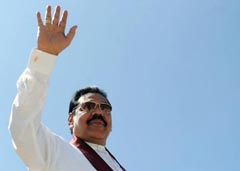 Mahinda Rajapakse Mahinda Rajapakse
Sri Lanka's powerful president, Mahinda Rajapakse, was sworn for a second six-year term that he promises will deliver an economic rebirth after decades of ethnic conflict.
Rajapakse, who turned 65, took the oath of office on an open-air stage overlooking the Indian Ocean, in a nationally televised ceremony that included a military march-past by thousands of troops.
Security was tight for the ceremony in the capital Colombo, where a holiday was declared to mark the occasion 10 months after the president's re-election victory in January's presidential polls.
Rajapakse had called the election two years early to take advantage of soaring approval ratings in the wake of last year's military victory in the decades-old civil war with Tamil Tiger rebels.
The Supreme Court ruled that his inauguration should be delayed until the anniversary of his initial November 2005 presidential win.
Rajapakse begins his fresh mandate in an unprecedented position of strength following a constitutional revamp two months ago that further extended his executive powers.
With his personal popularity still running high, family members in key government positions, the opposition divided and his only serious political rival in prison, the president's control over the island republic seems complete.
Brushing off concerns voiced by countries like the United States that his powers pose a threat to Sri Lanka's democracy, Rajapakse insists they are necessary to rebuild the country.
Vowing to make Sri Lanka the "wonder of Asia," he has unveiled a series of ambitious infrastructure projects, including a 1.5-billion-dollar port in the southern town of Hambantota that he opened recently.
|TOP|
Reward for Taliban Info
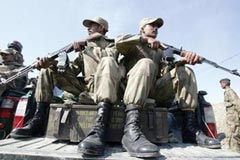 Pakistani soldiers patrol a street in Miranshah. Pakistan has announced a reward of 10 million rupees (around 120,000 dollars) to anyone providing information about the Taliban. Pakistani soldiers patrol a street in Miranshah. Pakistan has announced a reward of 10 million rupees (around 120,000 dollars) to anyone providing information about the Taliban.
Pakistan has announced a reward of 10 million rupees (around 120,000 dollars) to anyone providing information about the Taliban, as Islamabad struggles to defeat the Islamic militants.
"The government will make arrangements to settle the informers and their families anywhere in the country, even abroad, if they fear that Taliban might hurt them," Interior Minister Rehman Malik told reporters.
Malik said that most Taliban belonged to the banned Sunni militant outfits of Laskhar-e-Jhangvi and Sipah-e-Sahaba.
Lashkar-e-Jhangvi is regarded as Pakistan's most extreme Sunni outfit, accused of killing hundreds of minority Shiite Muslims after its emergence in the early 1990s. It was banned by then President Pervez Musharraf in 1999.
The group played a key role in the 2002 kidnap and murder of American journalist Daniel Pearl from Karachi and in twin failed assassination bids on key U.S. ally Musharraf in December 2003.
Sipah-e-Sahaba is also a banned Sunni extremist outfit behind attacks on Shiites.
Around 4,000 people have been killed in suicide and bomb attacks that have been blamed on homegrown Taliban and other militant networks across Pakistan since government forces raided an extremist mosque in Islamabad in July 2007.
Taliban and Al-Qaeda-linked militants have rear bases in Pakistan's northwest and semi-autonomous tribal belt on the Afghan border.
Afghan and U.S. officials say their leaders enjoy at least some measure of protection from Pakistan.
Pakistan flatly denies any collusion and says more than 2,420 of its soldiers have been killed fighting Islamist militants since 2002, when the United States put the country on the front line of its war on Al-Qaeda.
|TOP|
Tripura Beckons
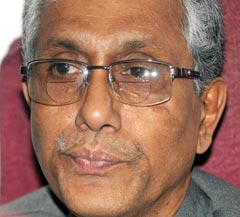 Manik Sarkar Manik Sarkar
Bangladesh can be economically benefited by exporting products to north-eastern region of India, taking advantage of proximity, said Tripura Chief Minister Manik Sarkar.
“Tripura is a potential hub for trade with Bangladesh in the entire north-east India. It is surrounded by Bangladesh on three sides, which enables easy access to the eastern, central, southern regions and, to some extent, to the north-eastern parts of Bangladesh from Tripura,” he said in an exclusive interview with The Daily Star at his secretariat office in Agartala Nov. 12.
Sarkar said India expects to continue using Ashuganj as a port of call for transit and transshipment after the Palatana power plant project in Tripura is over. Bangladesh has signed a memorandum of understanding allowing India to transport heavy power plant equipment for the project.
“If Ashuganj becomes a port of call, it will create scope for big financial gain for Bangladesh,” he said.
“We had a connection in the past and now we need to find out the missing links as those are very important for the connection. We need to revive the missing links for the economic development of the two countries,” the minister noted.
Tripura is the gateway to the entire north-eastern region of India so Bangladesh can derive economic advantages from the market of about 4 crore people and reduce the trade gap with India, he said.
Bangladesh enjoyed a trade surplus with Tripura last year. Bangladesh exported goods worth Rs. 150 crore to Tripura, while its import was worth only Rs. 10 crore. Sarkar believes Bangladesh’s trade would exceed Rs. 200 crore this year.
The presence of Bangladesh is conspicuous in Tripura where people not only speak Bangla, they also consume Bangladeshi products and even observe the language day on February 21 every year.
|TOP|
Anarchy Warning
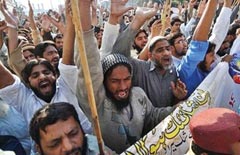 Islamists chant slogans against Aasia Bibi, a Christian mother sentenced to death. Islamists chant slogans against Aasia Bibi, a Christian mother sentenced to death.
Pakistani Muslims threatened protests and anarchy if the government pardons a Christian mother sentenced to death for blasphemy, calling hundreds of demonstrators onto the streets.
Demonstrators marched in the eastern city of Lahore after the most influential Sunni Muslim alliance in Pakistan urged the government not to grant mother-of-five Aasia Bibi clemency.
A crowd of several hundred called for "Jihad" and pledged to sacrifice their lives to protect the honor of the Prophet Mohammad, an AFP reporter said.
The rally was organized by a subsidiary of banned charity Jamaat-ud-Dawa, which the United Nations has blacklisted as a terrorist organization.
"We will hold nationwide protests if the government pardons the Christian woman," the subsidiary's chief coordinator, Qari Yaqub, told participants.
Politicians and conservative clerics have been at loggerheads over whether President Asif Ali Zardari should pardon Bibi, who was sentenced Nov. 8 to hang under controversial blasphemy laws for defaming the Prophet Mohammed.
"The pardon would lead to anarchy in the country," the head of the Sunni Ittehad Council, Sahibzada Fazal Kareem, told AFP.
"Our stand is very clear that this punishment cannot be waived."
The council opposes Taliban militants, which are fighting government troops in parts of northwest Pakistan, and has also organized a protest march against deadly attacks on Sufi shrines blamed on Islamist hardliners.
Pakistan has yet to execute anyone for blasphemy, but the case exposes the deep fault lines in the conservative country on a law that rights activists say encourages Islamist extremism in a nation wracked by Taliban attacks.
|TOP|
UN Wants Mechanism
Stating that there were still challenges in implementing the action plan to rehabilitate former child soldiers in Nepal, the United Nations has called for creation of a separate mechanism. The UN proposal comes amid allegations that despite the official discharge of thousands of former child soldiers as per the action plan, many of them are still under command of the Maoist army.
A UN team on visit to Nepal mentioned the concern to the Maoist leadership who in turn has agreed to verify the allegations on the field.
“This will be a matter that will be dealt with by the mechanism that will be established,” Claude Heller, chairperson of the Security Council working group on children and armed conflict said.
He stressed that the commitment made by Maoists not to have any contact with the discharged child soldiers will have to be respected.
Following the peace deal signed in 2006, nearly 19000 Maoist combatants are living in UN monitored cantonments. A 2007 survey found that 4008 of them were minors (30 percent of them girls).
But despite UN pressure, the release of these child soldiers was not taken seriously by Nepal government and the Maoist leadership. It took signing of an action plan in December last year to speed up the process.
The discharge process began in January this year by which time nearly 3,500 of these soldiers had attained 18 years of age.
After their discharge, the minors were to be provided education, health, business and vocational training by UN bodies to lead normal lives.
|TOP|
Patil, Assad Meet
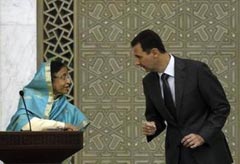 Syria's President Bashar al-Assad (r) speaks with Indian President Pratibha Devisingh Patil in Damascus. Syria's President Bashar al-Assad (r) speaks with Indian President Pratibha Devisingh Patil in Damascus.
India and Syria should take their historic ties to a new level, leveraging their growing importance in the world to each other's advantage, particularly in the economic sphere — this was the message that President Pratibha Patil and her Syrian counterpart, Bashar al-Assad, emphasized at a joint press conference at the impressive Kasra Sha'ab, the People's Palace, in the historic city of Damascus.
Earlier, when President Patil arrived to a red carpet welcome and a guard of honor at the Kasra Sha'ab — reserved for ceremonial occasions — she was received by Assad and the London-born First Lady Asma al-Assad.
Assad devoted close to half his statement to the press to the political element in the talks between the two leaders, focusing on bringing peace to the Middle East, even though India can play, at best, a modest role as a mediator between Israel and the Arab world. Both leaders, he said, reiterated their condemnation of terrorism in all forms: on the second anniversary of 26/11, he said Syria renewed its support to India in fighting terrorism. He also reiterated Syria's support to India's efforts to secure a permanent seat on the U.N. Security Council, and stressed the importance of reforming the U.N. so that it becomes “more democratic, representative and efficient.”
He said Syria supported the recent statement made by the Foreign Ministers of India, China and Russia on the right of Iran and all other countries to possess nuclear energy for peaceful purposes, “stressing at the same time the necessity of making the Middle East region free of all kinds of mass destruction weapons.”
|TOP|
Bribes-for-loans Scandal
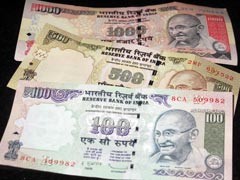 India's federal investigator is probing 21 sizeable companies for links to a bribes-for-loans scandal that has hit lending and infrastructure shares and hurt the country's image as an investment destination. India's federal investigator is probing 21 sizeable companies for links to a bribes-for-loans scandal that has hit lending and infrastructure shares and hurt the country's image as an investment destination.
The scandal, in which eight financial executives from the public and private sectors have been arrested, is one of several to dog the government of Prime Minister Manmohan Singh, putting to the test the ability of one of the world's fastest growing emerging economies to crack down on corruption.
Many of the companies the federal Central Bureau of Investigation (has linked to the bribes scandal are connected to the booming infrastructure sector -- builders of dams, hydro-electric plants, energy equipment makers and property developers.
India's stock market regulator SEBI has also stepped in with its own investigation into related possible insider trading, a source at SEBI told Reuters.
The Indian bond and rupee markets remained unaffected as traders did not view it as a risk to the banking system.
Analysts said the scandal, which comes just a few days after Singh had to defend his government in another case involving mobile phone licenses sold for below-market prices, could harm investor sentiment.
"This is just unfolding at this point in time. These are very serious issues which impact investor sentiments," said Nitin Jain, Singapore-based principal of fund manager Kotak Mahindra.
"If we can clearly say that we have done something right at this point in time and do proper things at this point in time then it's salvageable but otherwise it does have a potential to impact investor sentiments toward India from a medium-term perspective," Jain said.
|TOP|
Bihar Surprise
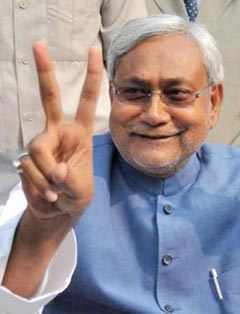 Nitish Kumar Nitish Kumar
The Nitish Kumar-led JD(U)-BJP alliance has won more than four-fifths of the Bihar assembly seats, but there is one unusual aspect to this landslide. The alliance got a little less than two-fifths of the votes cast.
This is unusual because other wins of similar magnitude in terms of seats have invariably been the result of substantially larger vote shares.
The comparisons with Sikkim or Tripura may seem misplaced given the much smaller size of these states. Similarly, the 1987 Jammu & Kashmir elections, which the National Conference and Congress fought as an alliance may seem an unfair yardstick given the doubts about the fairness of those polls.
However, even in a larger state like West Bengal, the massive verdict in favor of the Left Front government in 2006 was based on a vote share of nearly 50 percent. Similarly, when Rajiv Gandhi won a landslide in 1984 riding the crest of the sympathy wave generated by the assassination of Indira Gandhi, the Congress polled almost half of all votes cast.
Both these landslides have been dwarfed by the NDA's victory in the Bihar assembly polls, where the ruling combine won an astounding 85 percent of all the seats.
How is this possible with a vote share of under 40 percent? To put the apparent surge in favor of the Nitish-led alliance in perspective, its vote share in the latest elections was barely 2.9 percent higher than in the 2005 assembly polls, up from 36.2 percent to 39.1 percent.
What really made the difference was the complete collapse of the major opposition alliance. In 2005, that consisted of Lalu Prasad's RJD, the Congress, CPM and NCP. Between them, these four parties had polled 31.1 percent of the votes, just 5 percent less than the JD(U)-BJP combine. This time round, the main opposition alliance was the RJD-LJP combine, which together polled only 25.6 percent of the votes.
|TOP|
Nepal President Uses Emergency Powers to Pass Budget
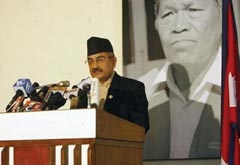 Nepalese Finance Minister Surendra Pandey Nepalese Finance Minister Surendra Pandey
Nepal's president used emergency powers to pass the long-overdue annual budget and stave off a looming economic crisis in the poverty-stricken Himalayan nation.
The budget should have been passed in July, but was delayed by the fall of the last government, since when 16 attempts to elect a new prime minister have failed, with no-one able to secure an absolute majority in parliament.
The country has not had a fully functioning government since June and has been surviving on emergency funds for the past four months, holding up vital development projects.
"The president, acting on the recommendation of the cabinet, has introduced an ordinance to end the budget deadlock," said Baman Prasad Neupane, a senior official in the president's office.
The president's move followed clashes in parliament when Maoist lawmakers tried to prevent the finance minister from entering the building to present the budget, prompting the speaker to close the house until Dec. 2.
The Maoists, who are in opposition, forced the last Prime Minister Madhav Kumar Nepal to step down in June.
Passage of the budget will allow the caretaker government to access new funds immediately, although parliament will still have to vote on the bill within the next 60 days.
Information Minister Shankar Pokharel said earlier the caretaker government had been forced to act because it was running out of money.
|TOP|
Amicable Solution
India has said it is keen on an amicable settlement of the Tamil issue but asserted that no strict time-line can be drawn for it.
Describing his four-day visit to Sri Lanka as satisfactory, External Affairs Minister S.M. Krishna said, "These are situations where a strict time-line cannot be expected. It all depends upon the government of Sri Lanka and how fast they would like to move in that direction."
"It all depends upon their comfort level and India is wholly interested in an amicable settlement of issues which seem to be of great concern," he told reporters on board the flight on his return.
"I have been supremely satisfied with the visit itself.”
|TOP|
Loan Scandal Checks
India told financial firms to look into their exposure to a string of public sector and other companies whose executives were arrested on suspicion of taking millions of dollars in bribes.
Police arrested eight people, including senior executives of leading state banks, in Mumbai on accusations of accepting bribes totaling more than 200 million dollars to facilitate large corporate loans to builders.
The arrests were the latest scandal to shake India's financial world, already reeling from a corruption controversy involving the cut-rate sale of telecom licenses that cost the public treasury up to 40 billion dollars.
Finance Minister Pranab Mukherjee told banks, financial institutions and insurance firms to review their exposure to companies named by the federal Central Bureau of Investigation in connection with the alleged loan racket.
Those arrested included the chief executive of LIC Housing Finance, India's second largest housing loan firm, as well as executives of the Bank of India, Central Bank of India and Punjab National Bank.
Police alleged those arrested had "received illegal gratification for issuing loans."
The finance minister's instructions came as a senior government official described the scandal as a "very small" incident as far as India's banking system was concerned.
"We should not make too much of a particular incident. The scale we are talking about... is very small as far as banking system as a whole is concerned," Planning Commission Deputy Chairman Montek Singh Ahluwalia said.
Ahluwalia added authorities had taken necessary steps and "our banking system is pretty well regulated.”
|TOP|
|
|
|
|
|
|